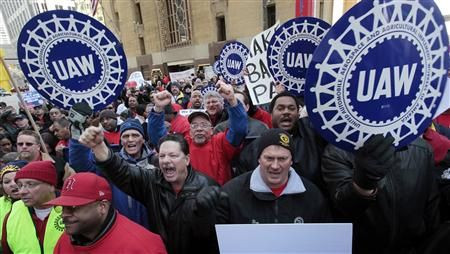Anti-UAW Labor Union For Auto Workers Raises Questions At Chattanooga VW Plant

Anti-union workers at Volkswagen’s plant in Chattanooga, Tennessee, won a victory with the announcement the German automaker would recognize their group, the American Council of Employees (ACE). VW’s Monday decision marks the latest chapter in a complex, hotly contested battle that’s pushing the bounds of American labor law and raising questions about the future of unions in the United States.
Last February, the United Auto Workers (UAW) union lost a closely watched election to become the exclusive bargaining voice for workers at the plant by a 712-626 margin. But the union stuck around: A few months later, the UAW formed what’s known as a “minority union” or “members-only union.” Local 42, which represents 45 percent of the shop floor, now meets with Volkswagen on a regular basis and bargains on behalf of its members. That’s made possible by VW’s support for labor-management consultation, an arrangement known in Germany as a “works council.”
ACE now offers an alternative for UAW-wary workers looking for representation at the plant -- even though, with 15 percent of the shop floor enrolled, the group will be meeting with Volkswagen less frequently than the UAW does.
“It’s a step toward creating a works council together, which is what VW wanted to do,” said Matthew Finkin, labor law professor at the University of Illinois.
“This is really about influencing VW to rule in favor of the interests of the workers they represent,” Seattle University School of Law Professor Charlotte Garden said. “It could be good for workers in the sense that both groups are trying to show they can get results that have workers’ best interests.”
But there’s more at stake than just a new framework for collective bargaining.
The growth of UAW Local 42 has raised the prospects, again, of the Detroit-based union winning exclusive representation rights. If the local has majority support at the factory -- and it claims to have more than 50 percent of workers on board -- VW can voluntarily recognize the UAW as employees’ exclusive bargaining agent. Alternatively, the UAW could file for another election to that effect and hope it works out better than last time.
Either scenario could spell a historic victory for a once mighty union struggling to keep a foothold in the 21st century economy. In recent years, the UAW has attempted to organize a series of foreign-owned auto factories in the South, famously hostile territory for organized labor. Chattanooga would mark the first such triumph -- no small achievement in a state whose Republican governor and junior U.S. senator have feverishly denounced the union’s presence.
Volkswagen’s official recognition of ACE, though, may slow the UAW’s momentum.
Chris Brooks, a pro-union activist in Chattanooga, said ACE smells like a company union, an illegal form of labor organization used by employers to pit workers against each other.
“This is, no doubt, a yellow union funded by corporate interests for the sole purpose of preventing the UAW from achieving exclusive representation,” Brooks said. He pointed to Republicans and their allies’ well-publicized opposition to the UAW in Tennessee, which they regard as a disincentive for potential employers seeking low business costs.
The American Council of Employees does not publicly disclose its donors. Employer-funded labor organizations are banned under the National Labor Relations Act.
Matt Patterson leads the Americans for Tax Reform-funded Center for Worker Freedom, which bankrolled part of the anti-union campaign in Chattanooga last year. He denied either group provides funding to ACE.
Patterson, in fact, said he’s skeptical of the group’s decision to bargain with Volkswagen.
“There used to be two options: the UAW or no union,” Patterson said. “Now there are three choices. The no union option is becoming a smaller percentage of the options.”
Meanwhile, UAW Local 42 President Mike Cantrell sounded an optimistic note, pointing to the UAW’s higher rate of support at the auto plant.
“We believe Volkswagen will honor its commitment to recognize UAW Local 42, and we will continue working toward the process of collective bargaining with the company,” he said.
© Copyright IBTimes 2025. All rights reserved.






















